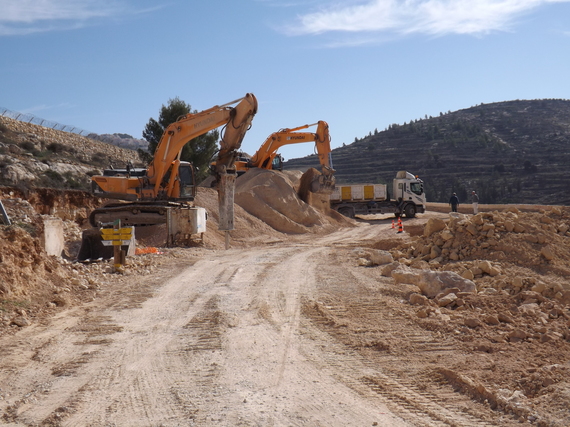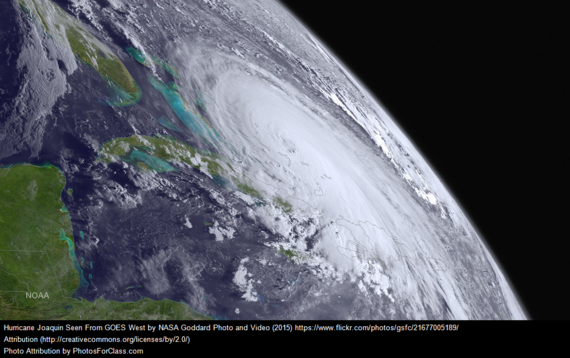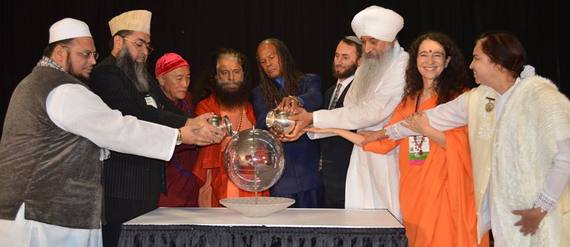I want to share with you and debunk a few commonly held views about how others will save us from our ecological crisis, in the hope of empowering us to take action ourselves.
One: God will save us, and therefore we don't have to do anything. This is refuted by a Jewish teaching, as well as other faith teachings: "When God created Adam, God took him and showed him all the trees of the Garden of Eden and said to him, 'See my works, how beautiful and praiseworthy they are. Everything that I created, I created for you. Be careful not to spoil or destroy my world--for if you do, there will be nobody after you to repair it...' " (Midrash Ecclesiastes Raba 7) The Creator is with us in this critical moment of human history, and is calling upon us to change our ways.
Two: Technology will save us. While some deny the science of climate change, others put their faith in technology as the way out of the crisis. This belief was reinforced this month when Bill Gates announced that he and tens of other billionaires are launching a renewable energy fund. Yet as Pope Francis teaches in his Encyclical, "There is a growing awareness that scientific and technological progress cannot be equated with the progress of humanity and history, a growing sense that the way to a better future lies elsewhere."
In regards to the 'Energy Miracles' plan put forth by Gates and others, Tate Williams writes in Inside Philanthropy that such "an Apollo-style push...is not only a misguided strategy for mitigating climate change, it could also distract funders with the enticing idea that invention is going to rescue us from this problem." Or as Naomi Klein writes in This Changes Everything, Gates "taps into what may be our culture's most intoxicating narrative: the belief that technology is going to save us from the effects of our actions." Klein also documents how actual giving by billionaires on climate change has fallen far short of their previous pledges over the years.
Three: Political leaders will save us through the new climate agreement. Yet as Dr. James Hansen, one of the world's leading climate scientists, points out, the voluntary emissions reduction targets that the world's political leaders agreed to will fall far short of their stated desire to keep global temperature rise to below 2 degrees Celsius. That is the likely threshold beyond which we will pass tipping points for the continued existence of human and most life on this planet.
Four: Philanthropists will save us through their current giving. To counter and change this view, the heads of the Hewlett and Packard Foundations, Larry Kramer and Carol Larson, published an important piece in the Chronicle of Philanthropy:
"Climate change is the defining issue of our day. It is an urgent global crisis that affects everything philanthropy seeks to do, whether it is to improve health, alleviate poverty, reduce famine, promote peace, or advance social justice. It is a problem that can and must be solved -- a problem that demands action now, while we still have time...Currently less than 2 percent of all philanthropic dollars are being spent in the fight against climate change. That is not enough given how big of a threat we face..." (By comparison, the largest gift to a single cause last year was $650 million to support research in mental health, which likely trumped all of climate funding combined!).
Kramer and Larson continue, "Climate change isn't just an environmental problem. It is an everything problem. Its effects all cultures, all incomes, and all geographies... When we consider all of our grant-making priorities -- children, education, health, reproductive rights, oceans, our communities, and so much more -- it is profoundly clear that climate change has the unique potential to undermine everything we care about... we can no longer sidestep the threat that a warming planet presents to all the good we seek to achieve in the world. Left to its current course, the impact of global climate change threatens the long-term success of every other effort..."
Within funding for sustainability is a subset of funding for mobilizing faith communities to raise awareness, inspire behavioral change, and promote political action on the issue. The amount of funding in that area is a drop in the bucket compared to total environmental giving, which is a drop in the budget compared total philanthropy.
Pope Francis wrote in Laudato Si: "Hope would have us recognize that there is always a way out, that we can always redirect our steps, that we can always do something to solve our problems. Still, we can see signs that things are now reaching a breaking point, due to the rapid pace of change and degradation."
As Pope Francis ramps up his advocacy on climate change, the game-changing potential of faith leaders, clergy, and religious institutions to reach out to much of the world's population and spur practical behavioral changes for sustainability becomes increasingly clear. Despite decades of attempts at climate change mitigation, society has yet to succeed in catalyzing a collective global response commensurate with the challenge. This stems in part from the failure to engage those people with perhaps the greatest track record of inspiring behavioral change on a mass scale, namely, faith leaders, clergy, and religious teachers. Many such people understand that climate change and the environmental crisis are spiritual crises that require focus at their spiritual roots for truly effective solutions to emerge. Clergy are also unique voices calling for intergenerational justice, moderating consumption, and thinking long-term.
My hope and prayer is that giving to causes working to promote a sustainable human society will grow, and that the next generation will inherit a thriving and livable planet.



